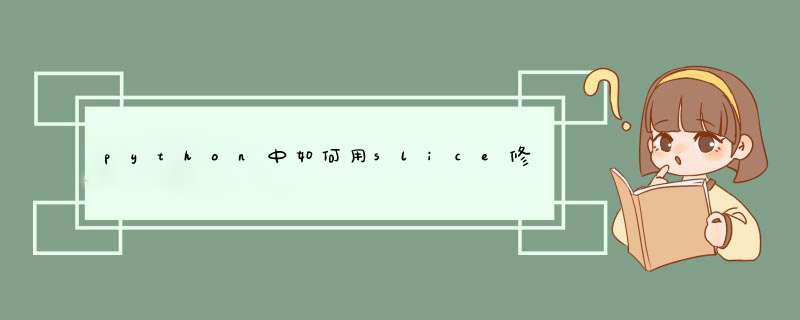
在列表中常用到切割的思想,对数列进行分离,这就是小编本篇要着重讲到的slice函数。一般我们提到slice会习惯性的使用切割的方法,在使用上就不能完成发挥它的作用。其实我们完全可以用slice对序列里的元素进行修改和删除,毕竟同切割一样与序列的关系密不可分。下面我们就python中用slice修改元素的方法给大家带来分享。
1.切片语法列表
# https://stackoverflow.com/questions/509211/understanding-slice-notation # 切片的形式(stride > 0) >>> seq[:] # [seq[0], seq[1], ..., seq[-1] ] >>> seq[low:] # [seq[low], seq[low+1], ..., seq[-1] ] >>> seq[:high] # [seq[0], seq[1], ..., seq[high-1]] >>> seq[low:high] # [seq[low], seq[low+1], ..., seq[high-1]] >>> seq[::stride] # [seq[0], seq[stride], ..., seq[-1] ] >>> seq[low::stride] # [seq[low], seq[low+stride], ..., seq[-1] ] >>> seq[:high:stride] # [seq[0], seq[stride], ..., seq[high-1]] >>> seq[low:high:stride] # [seq[low], seq[low+stride], ..., seq[high-1]] # 切片的形式(stride < 0) >>> seq[::-stride] # [seq[-1], seq[-1-stride], ..., seq[0] ] >>> seq[high::-stride] # [seq[high], seq[high-stride], ..., seq[0] ] >>> seq[:low:-stride] # [seq[-1], seq[-1-stride], ..., seq[low+1]] >>> seq[high:low:-stride] # [seq[high], seq[high-stride], ..., seq[low+1]]
2.修改序列/元素、删除序列元素
切片除了可以查找序列中的元素之外,还有一些重要的功能就是修改序列/元素、删除序列元素。
# 修改 l = ['a', 'b', 'c', 'd', 'e', 'f', 'g', 'h', 'i'] l[1:4] = [1, 2, 3] # 修改后结果为:['a', 1, 2, 3, 'e', 'f', 'g', 'h', 'i'] l[1:2] = [1, 2, 3] # 修改/替换后的结果为:['a', 1, 2, 3, 2, 3, 'e', 'f', 'g', 'h', 'i'] # 插入 l = ['a', 'b', 'c'] l[:0] = [1, 2, 3] # 插入后结果为:[1, 2, 3, 'a', 'b', 'c'] l = ['a', 'b', 'c'] l[len(l):] = [1, 2, 3] # 插入后结果为:['a', 'b', 'c', 1, 2, 3] l = ['a', 'b', 'c'] l[1:1] = [1, 2, 3] # 插入后结果为:['a', 1, 2, 3, 'b', 'c'] # 删除 l = ['a', 'b', 'c', 'd', 'e'] l[1:5] = [] # 删除后结果为:['a'] # 还可以用 del 语句删除序列中的部分元素 l = ['a', 'b', 'c', 'd', 'e'] del l[1:5] # 删除后结果为:['a'],效果一样
以上就是我们在python中用slice修改元素的方法,同时也可以进行元素的删除,小伙伴们可以两个使用功能分别尝试下代码。
欢迎分享,转载请注明来源:内存溢出

 微信扫一扫
微信扫一扫
 支付宝扫一扫
支付宝扫一扫
评论列表(0条)